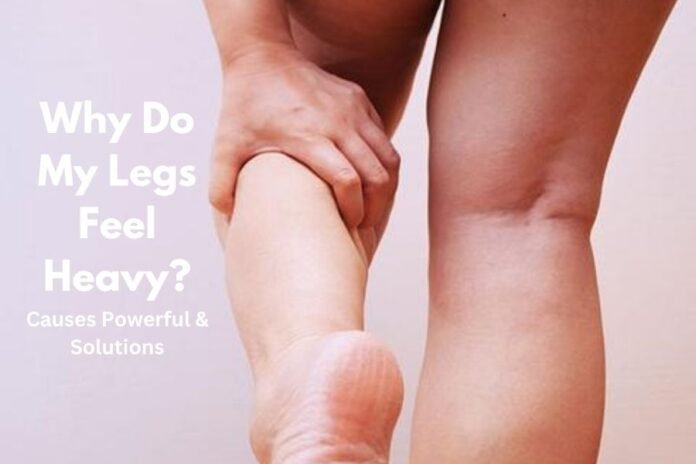Why Do My Legs Feel Heavy?
Feeling like your legs are weighed down can be irritating and uncomfortable. Whether it’s a dull heaviness or a dragging sensation, this problem can intrude with daily activities, making it hard to walk, stand for lengthy periods, or interact in physical exercising. This pain can range from moderate to extreme and may be temporary or continual.
Heavy legs often end result from movement issues, muscle fatigue, or underlying health conditions. Factors which include extended sitting or standing, lack of motion, dehydration, or clinical conditions like varicose veins and nerve issues can make a contribution to this sensation. Understanding the purpose is critical because the proper solution relies upon the underlying trouble.
Fortunately, numerous remedies can help alleviate heavy legs, from life-style modifications to scientific remedies. This manual explores the causes, signs and symptoms, and the best ways to manipulate and prevent heavy legs, supporting you to regain consolation and mobility.
What Causes Heavy Legs?
The sensation of heavy legs can stem from more than one element, which includes movement issues, muscle fatigue, nerve disorders, and fluid retention. Poor blood goes with the flow, which often results from extended sitting or status, can cause swelling and pain. Additionally, overuse of leg muscle tissues or a sedentary life-style can make contributions to muscle weakness and heaviness.
Underlying scientific situations including varicose veins, continual venous insufficiency (CVI), and peripheral artery sickness (PAD) may also be accountable. Recognizing the foundation motive is vital for determining the only remedy and preventive measures.
How Poor Circulation Leads to Heavy Legs
Poor move takes place whilst blood struggles to float efficiently thru the veins and arteries. This can result from an extended state of being inactive, weight problems, or even sporting tight apparel that restricts blood flow. When move is compromised, oxygen and nutrients fail to attain leg muscles well, leading to a sensation of heaviness and fatigue.
Certain lifestyle habits, which include smoking and consuming excessive salt, can further worsen circulation, making legs feel worn-out and swollen. Improving blood flow through movement, hydration, and dietary adjustments can significantly relieve heavy legs.
Chronic Venous Insufficiency and Heavy Legs
Chronic venous insufficiency (CVI) is a situation wherein the veins inside the legs conflict to return blood to the heart, causing blood to pool inside the lower limbs. This leads to symptoms including swelling, aching, and a persistent feeling of heaviness. People with varicose veins are in particular vulnerable to CVI, as weakened vein walls and valves fail to feature efficiently.
Over time, CVI can result in pores and skin discoloration, ulcers, and extended soreness. Compression therapy, normal motion, and medical treatments can assist control signs and symptoms and improve leg fitness.
Peripheral Artery Disease (PAD) and Leg Heaviness
Peripheral artery sickness (PAD) takes place when arteries slender because of plaque buildup, reducing blood flow to the legs. This condition frequently causes leg pain, cramping, and a dragging sensation, specifically throughout physical pastime. Many humans with PAD revel in alleviation after resting, but the trouble worsens if left untreated.
Those at better risk include people who smoke, diabetics, and individuals with excessive cholesterol or high blood strain. Addressing PAD early with lifestyle modifications, medicinal drug, and medical intervention can prevent complications like ulcers and tissue harm.

Muscle Fatigue and Overuse as a Cause
Heavy legs are not unusual after extreme bodily interest, as muscle fibers quickly ruin down and rebuild. Overtraining without ok relaxation can cause prolonged muscle fatigue, mainly to stiffness, pain, and a feeling of heaviness.
Conversely, a sedentary life-style weakens the muscle mass over time, making even basic movements experience strenuous. Balancing workout with right restoration, stretching, and hydration is important for maintaining strong, responsive leg muscular tissues.
Nerve Compression and Heavy Legs
Nerve compression, such as sciatica, can cause leg heaviness together with pain, tingling, and numbness. This takes place while nerves inside the lower backbone grow to be pinched due to herniated discs, bone spurs, or spinal misalignment. The soreness often radiates down one or both legs, making motion hard.
Addressing nerve-related issues may also require bodily therapy, posture correction, or medical intervention. Strengthening center muscle tissues and keeping spinal fitness can help save you habitual episodes of nerve compression.
Fluid Retention and Swelling within the Legs
Excess fluid buildup, known as edema, could make the legs experience heavy and swollen. This condition frequently results from kidney ailment, heart failure, immoderate salt consumption, or hormonal imbalances. Women can also enjoy fluid retention due to hormonal adjustments throughout pregnancy or menstruation.
To lessen fluid retention, restricting sodium intake, staying hydrated, and tasty in regular movement can help. In intense instances, scientific assessment is important to rule out underlying fitness issues.
Symptoms That Accompany Heavy Legs
Heavy legs are frequently accompanied by using different symptoms that offer clues to the underlying cause. Swelling, cramping, tingling, and stiffness are common. In cases of a terrible stream, legs might also seem pale, blue, or swollen, while nerve troubles may motivate numbness or burning sensations.
Severe symptoms such as pores and skin discoloration, open sores, or one-sided swelling require immediate medical attention. Identifying related symptoms can manual right remedy and improve leg fitness.
Best Exercises for Heavy Legs Relief
Regular physical activity improves flow, strengthens muscle tissue, and prevents fluid buildup. Walking, swimming, and cycling are awesome low-affect sports that sell blood waft. Yoga and stretching also can relieve muscle tension and enhance flexibility.
Performing calf raises, ankle rotations, and simple leg lifts can decorate streams and decrease the sensation of heaviness. Consistency is fundamental to keeping strong, healthful legs.
How Elevation and Compression Help
Elevating the legs above coronary heart degree for 15-20 minutes each day can reduce swelling and promote better movement. This simple practice is particularly beneficial for folks that stand or sit down for lengthy periods.
Compression socks paintings by means of making use of gentle strain to the legs, stopping blood from pooling within the lower limbs. These socks are beneficial for individuals with varicose veins, movement problems, or extended immobility.
The Role of Hydration and Diet
Proper hydration is important for keeping blood going with the flow and muscle features. Drinking enough water prevents dehydration-associated flow problems that make contributions to heavy legs.
A weight loss plan wealthy in potassium, magnesium, and omega-3 fatty acids helps vascular fitness and decreases infection. Reducing processed ingredients and immoderate salt consumption can help save you fluid retention and swelling.
When to Seek Medical Attention
Persistent leg heaviness, swelling in one leg, or pores and skin changes may suggest serious conditions like deep vein thrombosis (DVT). Symptoms along with redness, warm temperature, or unexpected pain require immediate medical evaluation.
Ignoring these caution symptoms can cause complications like blood clots or persistent circulate problems. If way of life modifications fail to enhance signs and symptoms, consulting a healthcare provider is critical.
Preventing Heavy Legs for Long-Term Relief
Preventing heavy legs entails a mixture of ordinary workout, hydration, proper shoes, and keeping off extended sitting or status. Managing weight and incorporating movement into each day’s workouts can drastically lessen leg pain.
Routine medical checkups can help stumble on early signs of movement problems or different fitness concerns. Taking proactive steps can improve average leg health and save you habitual heaviness.
Conclusion
Heavy legs may be due to circulation troubles, muscle fatigue, nerve compression, or fluid retention. Addressing those problems thru workout, hydration, and life-style adjustments can provide lasting relief. If signs and symptoms persist or get worse, a clinical session is important to rule out critical situations and make lengthy-term consolation.
FAQs
Why do my legs feel heavy whilst taking walks?
Heavy legs even as on foot may additionally end result from negative flow, muscle fatigue, or nerve compression.
Can dehydration motivate heavy legs?
Yes, dehydration can affect blood glide and muscle function, leading to a sense of heaviness.
Are heavy legs a signal of heart troubles?
In some instances, circulation problems connected to heart disease can also cause leg heaviness.




